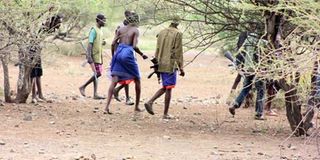Getting to the root of perennial conflicts

Armed residents of Mukutani, Baringo County, keep vigil after an attack by Pokot cattle rustlers in the area in 2014. PHOTO | CHEBOITE KIGEN | NATION MEDIA GROUP
What you need to know:
- The Pokots believe all the cattle belong to them, while the Turkana believe all the camels are theirs.
- Each community will go to great lengths to collect what they believe is theirs by right, the distance and risk notwithstanding.
- You cannot disarm only one group and leave the others, as it would then be easily overran.
I read a lot and listen to stories in the media and in conversations about the perennial conflicts between the Pokot and Turkana communities, and they dismay me.
The reason is that no one, not even the political or other leaders in the two communities wish to explain to fellow Kenyans the real truth as to why clashes in and around their areas have been going on for so long and continue to date.
Some time in 1977 a team of civil servants, including myself, was sent to West Pokot by Mr Abraham Kiptanui, who was then a powerful man in the Vice-President’s office at the Home Affairs ministry.
Being young people and having no knowledge of where we were being sent, we resisted for about a week.
LOSE OUR JOBS
After this, Mr Kiptanui gave us an ultimatum to proceed to Kapenguria or lose our jobs.
We had everything we required, including government Land Rovers with tents, generators and camping equipment.
Whoever sent us knew what we would encounter.
Eventually we did go to West Pokot. Accompanying us was the local MP, Francis Lotodo, and the District Officer, Mr Peter Ndemo, who, I believe, retired after being promoted to a District Commissioner.
GOOD RECEPTION
We arrived at Makutano Township to a good reception by other government officials, who were a close-knit community.
Incidentally, they were all from other communities as there were no Pokots who could take up their positions.
To put matters in the right perspective, the highest authority the Pokot knew was the chief.
Many didn’t even know who founding President Mzee Jomo Kenyatta was.
LOCAL CHIEFS
We could not operate in the interior of Pokot without the assistance of local chiefs.
With the help of the chiefs we were able to operate in such areas as Makutano, Kapenguria, Sigor, Alale, Kacheliba, Nauyopong, Lelan, Chepararia, Sebit, Ortum, Moroto, Kasei, Lomut, and Amudat.
I wish to explain what the top leaders in the two communities do not tell Kenyans for whatever reason or due to historical ignorance of events.
First one must understand that both communities are pastoralists and mistrust each other deeply.
TURKANA RAIDERS
The reason for this is that Pokots believe all the cattle belong to them, while the Turkana believe all the camels are theirs.
In fact, the chief in charge of Alale, where we stayed for some time, was killed by Turkana raiders, who took away his camels that provided us with milk.
What many people don’t address is the fact that on the other side of things is another pastoral community, the Karamojong of Uganda, leaving the Pokots in the middle.
The Karamojong are also a pastoral community that is fiercely protective of their cattle and heavily armed from Ugandan dictator Idi Amin’s era.
HEAVILY ARMED
The members of all these three communities are always heavily armed.
Each community will go to great lengths to collect what they believe is theirs by right, the distance and risk notwithstanding.
And this includes dairy cows in Kitale. I wish members of these communities could use their prowess in long distance running for their benefit. Kenya would be more successful in athletics than it is today.
You cannot disarm only one group and leave the others, as it would then be easily overran.
In Pokot, any stranger is referred to as Ngoroko.
CATTLE RUSTLERS
This is probably where retired President Daniel arap Moi found the name that was later used to refer to cattle rustlers.
Pokots are in the middle of two “enemies”. To end the perennial violent crisis between these antagonistic communities, Kenya must tackle the problem jointly with Uganda.
The Kenyan authorities cannot do it without the close collaboration of their Ugandan counterparts.
Mr Ngugi is a human resource expert and a social commentator. [email protected]





